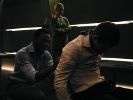Eye For Film >> Movies >> Exam (2009) Film Review
For anyone who has ever suffered from anxiety dreams about showing up to an important test late, unprepared or dressed only in pyjamas, Stuart Hazeldine's feature debut Exam may well strike a chord.
Here, eight candidates competing for a high-ranking position in an exalted company discover that the paper on the desk before them is blank, and that they have 80 minutes in which to work out not just the answer, but the question, too. As the Invigilator (Colin Salmon) explains before the countdown begins, candidates are not permitted to attempt communicating with him, to spoil their own papers, or to leave the room for any reason – and breaching any one of these three rules will result in immediate disqualification.

Once the exam is underway, allegiances are formed, hostilities are established, ideas are shared, betrayals are enacted and pathologies of every kind are exposed, as the candidates all reveal just how far they are willing to go for an appointment whose particulars are not even known to them. So although, according to a caption near the film's beginning, the action is set 'soon' rather than now, this is very much a story for our own 'dark times' (to borrow the Invigilator's expression), where recession, unemployment and sheer desperation can make cutthroats of us all. Evocations of TV's The Apprentice confirm the film's engagement with contemporary concerns – while a passing reference to Jean-Paul Sartre suggests that this is a sort of No Exit for the Noughties' Generation Me, where hell is other people's greed and narcissism.
With its single setting, and its events unfolding in real time, Exam boasts a unity of time and place that is positively Aristotelian – but it also stands and falls on the strength of its high concept. It starts with a collection of blank slates – not just the question-free test papers, but also the cipher-like candidates, the mysterious organisation, even the bare minimalism of the room in which the exam is being sat. Of course, room, business and characters alike all harbour hidden secrets, and it is in its gradual revelation of these that Exam drifts from being genuinely enigmatic and moody to derivative, disappointing, even ridiculous.
Viewers will quickly recognize the influence of other 'claustrophobic' films – there is the nicknaming of Reservoir Dogs (1992), the disparate/desperate ensemble efforts of Cube (1997), the 'torture porn' of Saw (2004) and the reactive space of Fermat's Room (2007) – but when Exam has to come up with its own solutions, their ingeniousness never quite seems enough to outweigh the pointlessness of much else that happens between the beginning and the end.
"This could all be a distraction, you know," declares Dark (Adan Beck), "we could all be missing something obvious." She is not wrong - for while the answer (and question) to the test may, in a well-handled twist, become obvious only in retrospect, a second twist is rather too obvious from the start, and much else in the film serves largely as distraction, and so feels dispensable. The film's ultimate explanation of the test's purpose and the post's precise nature manages to expand the candidates' relatively petty, self-made moral dilemmas into a broader discussion of the ethics of triage, but viewers will find themselves tested by much bickering, brawling and shrill overacting - especially from Jimi Mistry as the gambler Brown - to get there.
Right – any questions?
Reviewed on: 27 Dec 2009



















